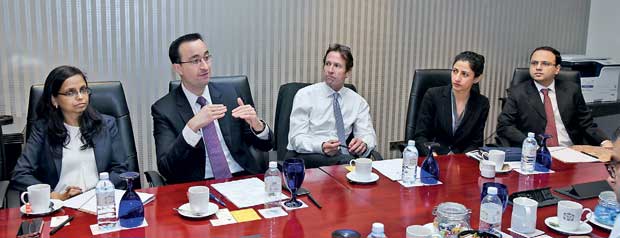Reply To:
Name - Reply Comment

A team of economists from the Standard Chartered Bank yesterday ‘strongly recommended’ Sri Lanka continuing with the International Monetary Fund (IMF) programme and strengthening the country’s foreign reserve base to face turbulent times forecasted globally.
“We strongly recommend Sri Lanka to continue with the IMF reform plan. If the right monetary and fiscal policies are employed, Sri Lanka has huge potential,” Standard Chartered’s South Asia Economic Research head Anubuti Sahay told the media in Colombo.
Sri Lanka has entered into an extended fund facility amounting to US $ 1.5 billion with the IMF as the country’s finance ran into difficulties largely due to the populist policies adopted by the Sirisena-Wickremesinghe administration targeting a general election in August, 2015.
The country’s bloated public sector was given massive freebies and the Central Bank kept the interest rates artificially low, creating demand on cheap credit.
However this resulted in the erosion of the country’s foreign reserves and Sri Lanka sought IMF’s help to balance its books.
The funding from the IMF came with stringent conditions, essentially to create fiscal discipline, which the public felt mainly by way of significant tax increases and subsidy cuts.
In the meantime, to meet the fiscal targets, the government is attempting to restructure the loss making state-owned enterprises and monetize some of the mega infrastructure projects carried out by the previous administration through a privatization process, which has been met with much
public opposition.
According to Sahay’s collegue Saurav Anand, Standard Chartered’s economist for South Asia, boosting Sri Lanka’s foreign reserves, which have fallen below four months of imports is an immediate priority.
Sri Lanka ended 2016 with foreign reserves of just over US $ 6 billion after hitting its lowest level of US $ 5.3 billion in June. However the reserves were down by US $ 1.3 billion since January when the total stock was US $ 7.3 billion at the begging of the year.
Foreign holdings in government bonds have also strengthened but according to analysts a lot will depend on Fed’s interest rates policy following the Donald Trump’s presidency.
Sri Lanka spent little less than US $ 1 billion in reserves in 2016 to defend the rupee but ended up weakening the currency by 3.8 percent. In 2015, the country spent US $ 2.1 billion in reserves to defend the rupee only to see the currency depreciating 9 percent.
However the Central Bank under the new governorship of Dr.Indrajit Coomaraswamy doesn’t see it sensible to defend the rupee at the cost of the country’s reserves.
“It doesn’t seem sensible to spend large amounts of reserves defending the currency if you are going to depreciate,” Dr. Coomaraswamy told reporters after unveiling the Central Bank’s mid-term monetary and financial sector policies in early January.
The Standard Chartered Bank team of economists said they are expecting the year 2017 to be extremely challenging and added that risks remain large amid an uncertain sociopolitical environment.
“We are expecting an extremely challenging 2017 and sociopolitics are tough to call. We’ve seen some big surprises in the socio political front in the last six months. We think the risks are again large. So we are calling for an environment with fat-tail risks, which suggests that although we clearly have a view perhaps the risks around that view are a little higher than they usually are,” Standard Chartered Global research head Dave Murry said.
He pointed out the need for investors to remain nimble and thoughtful to protect themselves from tail risks and stressed that investors may not want to put all their eggs in one basket being in a tumultuous global setup.
Standard Chartered’s chief economist for Asia, David Mann, indicated that probably the only bright spot in this mayhem is the Asian economies, which have been growing steadily.
“If you want to find allies in the jungle I would look East,” Mann said referring to Standard Chartered’s latest research brief titled ‘Welcome to the Jungle.’
“It’s where 60 percent of world growth would come from this year, same as the last year,” he added.
Mann further said bad politics have met with bad economics in the West, which is reflected in the US election as well as the Brexit.
He said much has changed in the world in the last 15 years, where the West came first in global growth and Asia was way down the list, pointing towards the Asia’s dominance in the world economy.